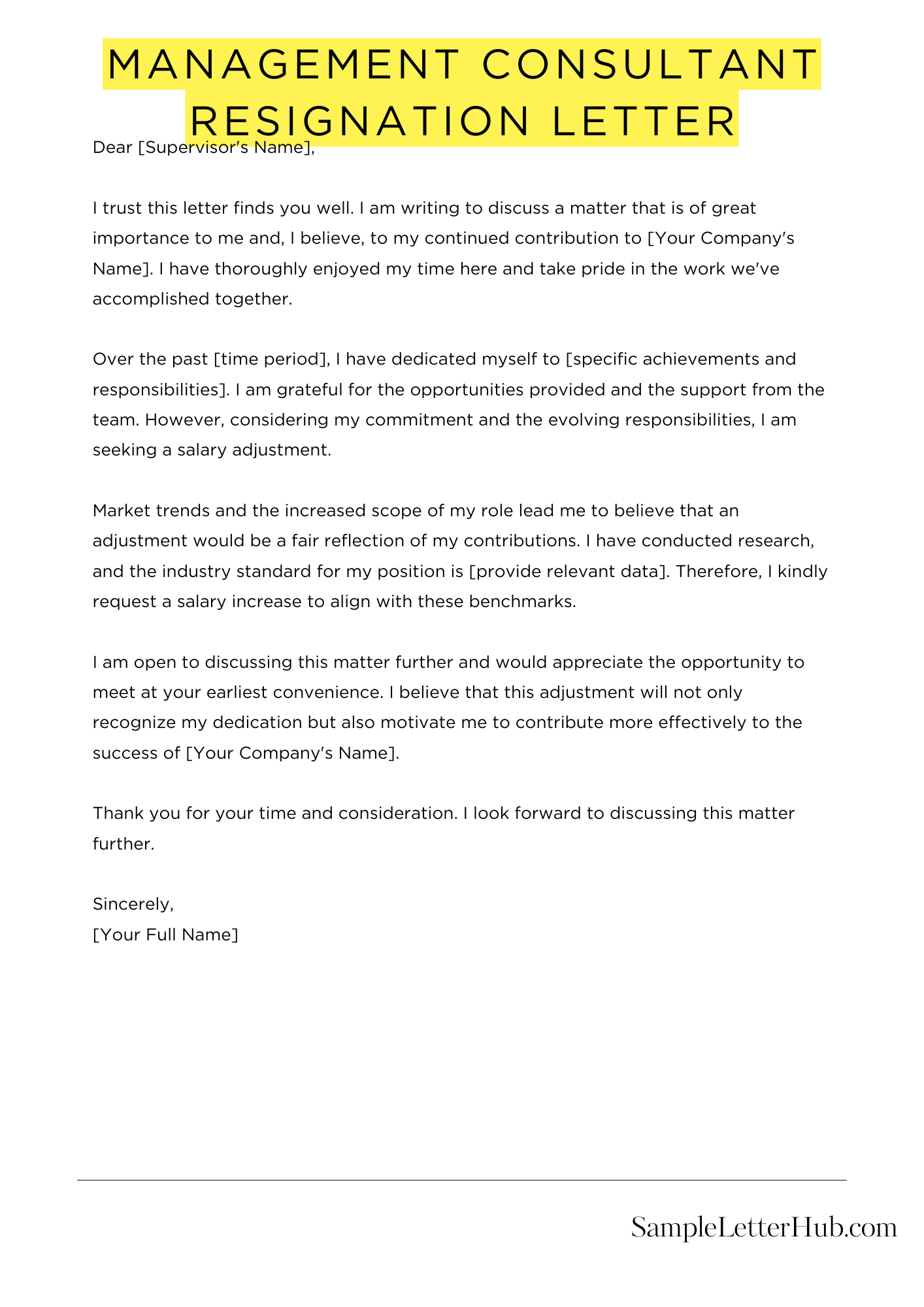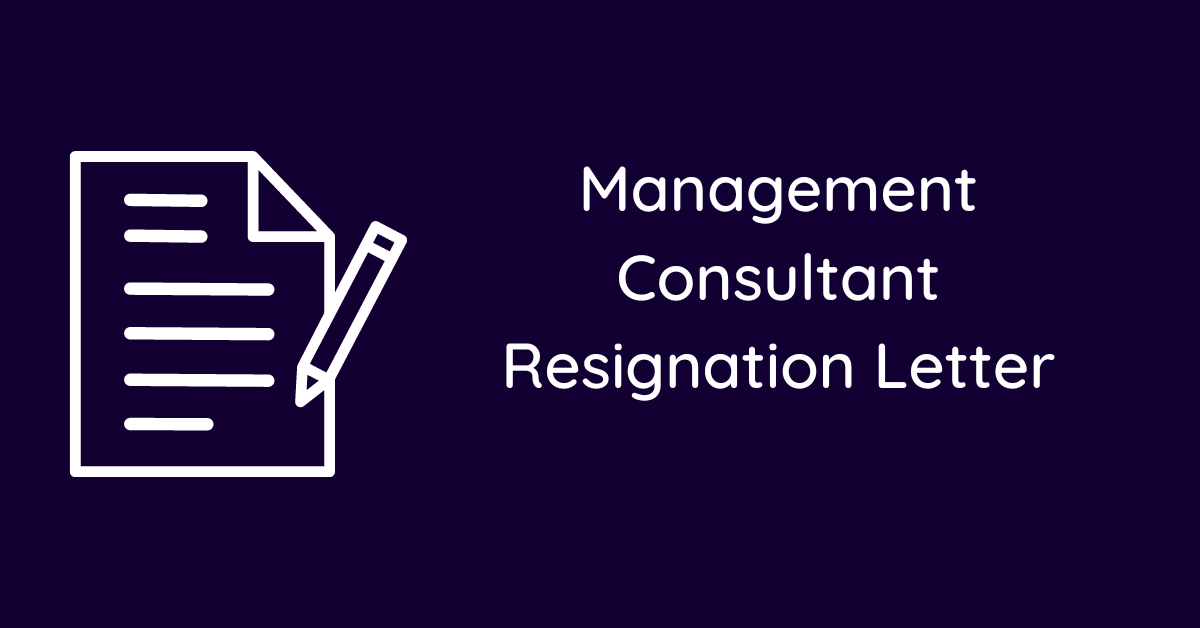If you’re a management consultant who’s decided to move on, writing a clear and professional resignation letter is a must. It’s a chance to explain your decision to leave and express your gratitude for the opportunity to work with your team.
When writing your letter, be polite and humble. Remember, you’re leaving on good terms, and you want to maintain a positive relationship with your former employer. Keep your letter brief and to the point, and avoid getting into any unnecessary details.
Below, we’ve included a template management consultant resignation letter that you can use as a starting point. Feel free to adapt it to fit your specific situation.
Management Consultant Resignation Letter
Dear [Recipient Name],
Please accept this letter as formal notification that I will be resigning from my position as Management Consultant at [Company Name], effective two weeks from today, [Date].
During my time at [Company Name], I have had the privilege of working on a wide range of challenging and rewarding projects. I am grateful for the opportunities I have been given and the valuable experience I have gained.
I wish you and [Company Name] all the best in the future.
Sincerely,
[Your Signature]
Short Management Consultant Resignation Letter Sample
Please accept this letter as formal notification that I am resigning from my position as Management Consultant at [Company Name]. My last day of employment will be [Your Last Day]. Thank you for the opportunity to grow and learn during my time here. I wish you and the company continued success. I am happy to assist in the transition process to ensure a smooth handover of my responsibilities.
I wish you all the best with your management consultant resignation letter.
When it’s time to say farewell, expressing your gratitude and best wishes can make the transition smoother:

How to Write a Management Consultant Resignation Letter
1. Start with a Formal Introduction
Begin your letter with a formal salutation, such as “Dear [Manager’s Name].” Clearly state your intention to resign from your position as a management consultant, including your last date of employment.
2. Express Gratitude and Appreciation
Take this opportunity to express your gratitude for the opportunities and experiences you’ve gained during your time at the firm. Mention specific projects or initiatives that you’re proud of and thank your manager for their support and guidance.
3. State Your Reasons for Leaving
While it’s not necessary to go into excessive detail, you can briefly mention your reasons for leaving. Be professional and avoid making negative comments about the company or your colleagues. Instead, focus on your personal goals and aspirations.
4. Offer to Help with the Transition
Demonstrate your commitment to a smooth transition by offering to assist in any way possible. This could include training your replacement, documenting your work, or providing guidance on ongoing projects.
5. End with a Professional Closing
Conclude your letter with a polite and professional closing, such as “Sincerely” or “Best regards.” Include your signature and typed name below.
Management Consultant Resignation Letter: 6 Frequently Asked Questions
When it comes to resigning from your position as a management consultant, it’s essential to do so professionally and effectively. Here are six commonly asked questions and their answers to guide you through the process:
1. What should I include in my resignation letter?
Your resignation letter should include the following key elements:
- A clear statement of your intent to resign
- Your last date of employment
- A brief expression of gratitude for the opportunity to work at the firm
- Any relevant details, such as any outstanding projects or handover arrangements
2. How should I format my resignation letter?
Use a professional letter format, including your name, address, date, and the recipient’s information. Keep the letter concise and to the point, typically one page in length.
3. What is the appropriate notice period?
The standard notice period for management consultants is two weeks. However, it’s advisable to check your employment contract or company policy for specific requirements.
4. Should I offer to help with the transition?
Yes, it’s a professional courtesy to offer assistance in ensuring a smooth transition during your departure. This could involve training your replacement or providing documentation on ongoing projects.
5. What should I do if I’m feeling nervous about resigning?
It’s natural to feel some apprehension when resigning. Take some time to prepare your letter and practice what you’re going to say to your manager. Remember, you’re entitled to make career decisions that are right for you.
6. What if I want to leave on good terms?
Maintain a positive and professional demeanor throughout the resignation process. Express your appreciation for the experience and offer to help in any way possible. Leaving on good terms can benefit your future career prospects and maintain valuable industry connections.
Before making the decision to resign from your job, it’s essential to consider the legal aspects:
Understanding your emotions after quitting your job is important. Explore why you might be feeling sad:
Related
- Resignation letter sample
- Forced resignation letter
- Resignation letter due to going abroad
- Resignation letter due to marriage
- Resignation letter due to other opportunity
- Resignation letter due to mistake

